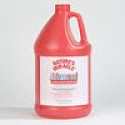Cat Spraying

Cat spraying, even though you love your cat and overlook a lot of his shortcomings including the occasional litter box problems...is an issue. When a friend comes to visit, it’s pretty embarrassing when they ask what that strong smell is.
My male cat Max Factor is neutered and yet he still marks his territory when he gets anxious about something, and although I try to figure out what’s stressing him, the spraying event has already happened. Figuring out how to control the stink …and figuring out how to stop your cat’s litter box problems…will require a multifaceted approach, including some detective work and elbow grease.
First, determine whether your cat has a health problem or if he needs to be retrained to use the litter box. Then, figure out whether the cat has been house-soiling or marking (cat spraying). Although both these problems involve urine, the motivations and the treatments of each differ.
Third, figure out what’s causing the cat to house soil or perform his cat spraying action and try to remove the stressor. Finally, find all the spots where your cat has been marking or urinating and treat them so he won’t be compelled to refresh his odor.
Always bring your cat in for a medical checkup before trying to cure the cat spraying problem. Your little friend’s indiscretions may not be due to a bad attitude at all, but a urinary tract infection. Nevertheless, once you return home with the medicine, you’ll still need to deal with any odors and stains left behind.
Remember, regardless of the reason for the accidents, don’t punish your cat…that will only add to his stress and compound the problem. Believe me, I’ve tried rubbing Max’s nose in it, in a stern voice telling him he’s bad……it doesn’t work. However, praising him and giving him treats when he uses the box helps and might help you.
Determining the problem of the feline spraying and soiling is usually characterized by normal amounts of urine being deposited near the litter box or in a few other discrete areas of the house. If you find urine spots on numerous flat, vertical surfaces, especially close to an exit or entrance that juts out into the room, this is indicative of cat spraying. Max has a habit of cat spraying anything new on the perimeter such as a box that was delivered a few hours before.
Think back to when the transgressions first began. Was it the time you brought home a new boyfriend, spouse, baby or pet? Did you change the brand of cat litter or location of the litter box? Did you start using liners or add a scent to the litter or forget to scoop the box that day?
Did you put a carpet runner under the box, move furniture, or buy new carpeting? Any sudden changes could cause the cat to alter ordinarily good habits. If stress is causing the problem, try to eliminate the source.
In my situation, Max was a stray that was stressed when he arrived. He was nervous and grooming a lot of his hair off so he looked pretty pathetic. In the beginning he was simply grateful to be brought inside (after the vet gave him a good bill of health).
However, over the next few months he had a power struggle with Revlon, our alpha female. He disagreed with the pecking order in the house and made it known. Revlon wasn’t going to cede any territory voluntarily so we had to step in and keep them apart most of the time on separate floors.
This has worked fairly well, but Revlon will periodically manage to get downstairs and then he’s upset again. So, with all the cat spraying that has happened, I’ve had to try numerous brands of cat urine odor removers to help with the cat spraying odors. Some have been successful and some have been a waste of money.
If you determine that the indiscretions are due to a litter box problem, examine your feline facilities. Try to have at least one litter box per cat (I’ve found that impossible to achieve due to space) and place them in low traffic areas that the cats frequent. After treating the soiled area, you could place the box on the site of the accident. Then, once your cat is using the box regularly, you can move it away from that spot gradually.
You also need to identify the culprit if your cat is in a multi-cat household. In our case, we knew it was Max. Then confine the problem cat to a small room, like a bathroom, with his litter box, food, and water in order to re-teach him litter box habits. Make sure to keep the litter box clean.
Give your cat a chance to get used to using the proper facilities again. Then let him out for short supervised periods until you feel comfortable giving him total freedom. If this fails, it may be time to ask your veterinarian about some short-term anti-anxiety medication to help your cat break the cycle.
If you have a behaviorist, he may recommend that you see a veterinarian. Our vet recommended using Feliway which is dispersed with a diffuser to permeate the room. You can’t smell it but the cat does. It contains calming feline pheromones so your feline relaxes more. I preferred this method to medications.
I know that it works most of the time but the diffuser, although it lasts about a month, sometimes runs out of the fluid when I’ve been busy and forgotten it. Once Max starts the cat spraying again, I check the diffusers to see which one is low. Sure enough, one of them will be dry. Although this is not a cheap solution, I have found that its worth it.
At the same time you’re stopping the cat urine odor at the feline source, you’ll need to find the root of the smell and treat the areas with an enzymatic neutralizing cleaner. Sometimes you can smell the odor, but you can’t find its exact location, especially when the locations are numerous. Purchase a black light from a pet supply or janitorial supply house.
Under the cover of darkness, your cat’s indiscretions from cat spraying will be obvious in florescent yellow. Mark them with a piece of masking tape, turn on the lights, and start your clean-up assault. Years ago there weren't any effective products on the market and the available chemicals simply masked the smell. Now there are newer products to fight the cat spraying odors.
I've been told the most effective type of cleaner is an enzyme digester that ingests the odor-causing bacteria from the carpet fibers. Enzymatic cleaners are necessary to break down the proteins in cat urine. The only problem is that enzymatic cleaners are only good for a short time once they’re open, so it’s best to buy small quantities frequently. The carpet and pad are not the only spots that need attention.
Even if the floor is cleaned, the odor from tiny spots of urine that have collected on the walls and baseboards may be calling your feline culprit back to the same place. Many of the newer products actually neutralize the odor by encapsulating it. Fortunately, the current generation of cat spraying odor control products is quite effective even when you can’t open a window to air out the room naturally. See the Cat Urine Remover article to see our tested products.
Related Articles......
Return from Cat Spraying to Cat Health Homepage
Having trouble finding what you need? Cat Health Index & Site Map
OR
Do you have a question to ask?...Questions
OR
Do you have a cat story to share?...Simply click here to go to that page!
Copyright@2010-2020 All rights reserved.Cat-health-detective.com
This website is information only. Consult a veterinarian for medical assistance

"Like Us" on Facebook
or...
"Like Us" here




















